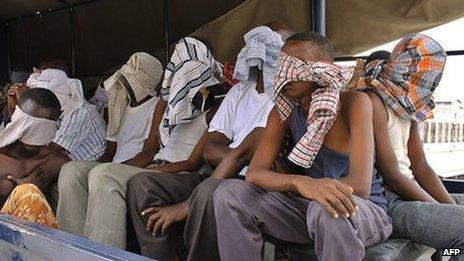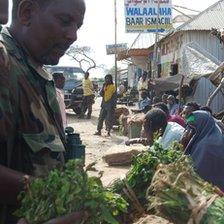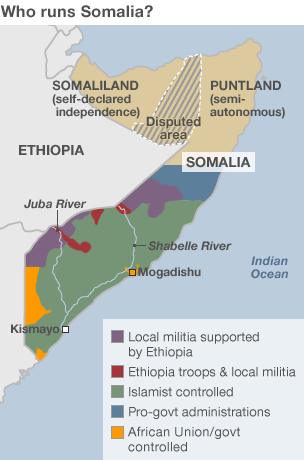Defections put militant al-Shabab on the run in Somalia
- Published

Suspected al-Shabab members rounded up by Somali troops
The Islamist al-Shabab group that controls much of southern Somalia has recently suffered several significant defeats. The BBC's Gabriel Gatehouse has been travelling with Ugandan soldiers in the African Union force that has been fighting the al-Qaeda-allied militants and reports from Afgoye, until last month one their key strongholds.
We were standing in the shade of some trees, sheltering from the vicious midday sun, when the unmistakable strains of Grieg's Peer Gynt began emanating from the pocket of a young man in camouflage fatigues.
Dum di dum dum dum-dum-duuum…
The young man reached for his mobile and squinted at the screen. "I don't recognise the number," he said, letting it ring.
As the tune continued, my curiosity was piqued.
"Perhaps it is one of your old friends?"
The young man nodded. His name was Absher Ali Mohammed, nom de guerre "Abu Khalit". He was a defector from al-Shabab.
The call was from Abu Khalit's former commander.
The two spoke in Somali, I could not understand the conversation, but I could hear it - the discussion was lively and punctuated by bursts of laughter.
"What did he say?" I asked.
"He accused me of being an apostate," Abu Khalit said.
Al-Shabab is being pushed out of towns and villages in southern and central Somalia by Ugandan and other African Union forces. The soldiers are by and large Christians.
Abu Khalit brushed away the suggestion that he had abandoned his Muslim faith.
"One day, you too will join us," he told his former commander.
It was that last remark that had prompted the loudest laugh at the other end of the line.
"If they catch me, they will slaughter me with their own hands, they will cut off my hands and legs," said Abu Khalit.
His commander in al-Shabab was a man by the name of Sheikh Mustaf. The defector said he was one of between 200 and 300 men under his command.
The sheikh had also acted as a local judge. His favoured punishment was amputation.
'Harassing people'
Abu Khalit said he had little time for the foreign fighters who provide the Islamist group with its ideological backbone.
"They hide their faces from us. They live in safe houses, and we are not allowed inside," he said.
When African Union forces took the town of Afgoye, near the capital, Mogadishu, at the end of last month, Abu Khalit and his fellow fighters had been pushed out of the area.
It was then that he decided to change sides.
"I realised al-Shabab did not want to bring freedom to the people. They were just harassing people."
Abu Khalit and another defector by the name of Gashan both said they had joined the Islamists out of a combination of religious and patriotic motives.

Khat leaves contain substances that have amphetamine-like properties
"When the African Union forces invaded, we were told, 'They are Christians, so you must defend your country and your religion,'" said Gashan, whose name means shield.
But some months ago, he said he noticed al-Shabab demanding tax by force.
They would confiscate animals from the nomads and carry out harsh punishments.
"I realised they were not about religion," he said. "They were about killing people."
So here they were, in the shadow of a tree, two defectors sharing a lunch of rice, chicken and goat meat with a contingent of Ugandan soldiers.
Later, we drove into town. There, another possible motive for their defection presented itself.
National obsession
At a crossroads on the outskirts of Afgoye, an impromptu market had sprung up; a line of tables, from which women in brightly coloured headscarves were selling small bunches of leaves.
For many Somalis, chewing this stimulant, known as khat, is a national obsession, close to a way of life.
Al-Shabab declared it to be "haram", forbidden, and banned it.

They would not have approved of Abu Khalit's musical ringtone either.
In that and many other ways, people here say al-Shabab have alienated the local population.
Once they enjoyed support for bringing relative stability where there had been chaos. That support now seems to be on the wane.
In the town of Baidoa, near the Ethiopian border, local residents said al-Shabab had been forcing young men and even boys to fight in a desperate attempt to bolster their numbers.
The result, they say, has been a wave of defections.
And the defectors have helped the African Union and their Somali interim government allies to arrest yet more fighters.
For many years now, the balance of power in Somalia has shifted among a patchwork of rival clan warlords.
People understand this system. They respect it.
For a while, al-Shabab became the dominant force in this power struggle.
But now the group is in retreat - many here sense its weakness and that may turn out to be the most fatal blow of all.
One man here observed: The African Union is now the biggest warlord in town.
<bold>How to listen to From Our Own Correspondent</bold> <bold>:</bold>
<bold>BBC Radio 4: </bold>A 30-minute programme on Saturdays, 11:30 BST.
Second 30-minute programme on Thursdays, 11:00 BST (some weeks only).
<link> <caption>Listen online</caption> <url href="http://www.bbc.co.uk/programmes/b006qjlq" platform="highweb"/> </link> or <link> <caption>download the podcast</caption> <url href="http://www.bbc.co.uk/podcasts/series/fooc" platform="highweb"/> </link>
<bold>BBC World Service:</bold> Hear daily 10-minute editions Monday to Friday, repeated through the day, also available to <link> <caption>listen online</caption> <url href="http://www.bbc.co.uk/programmes/p002vsng" platform="highweb"/> </link> .
Read more or <link> <caption>explore the archive</caption> <url href="http://news.bbc.co.uk/1/hi/programmes/from_our_own_correspondent/archive/default.stm" platform="highweb"/> </link> at the <link> <caption>programme website</caption> <url href="http://news.bbc.co.uk/1/hi/programmes/from_our_own_correspondent/default.stm" platform="highweb"/> </link> .